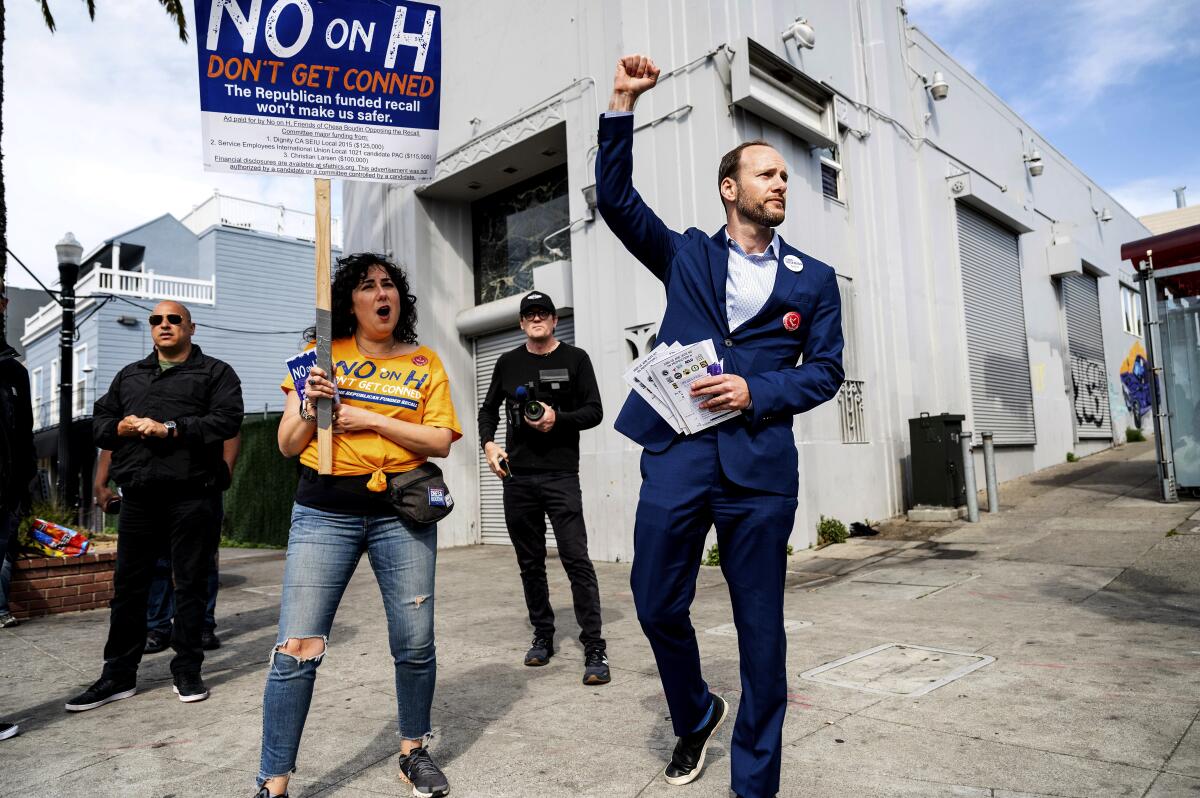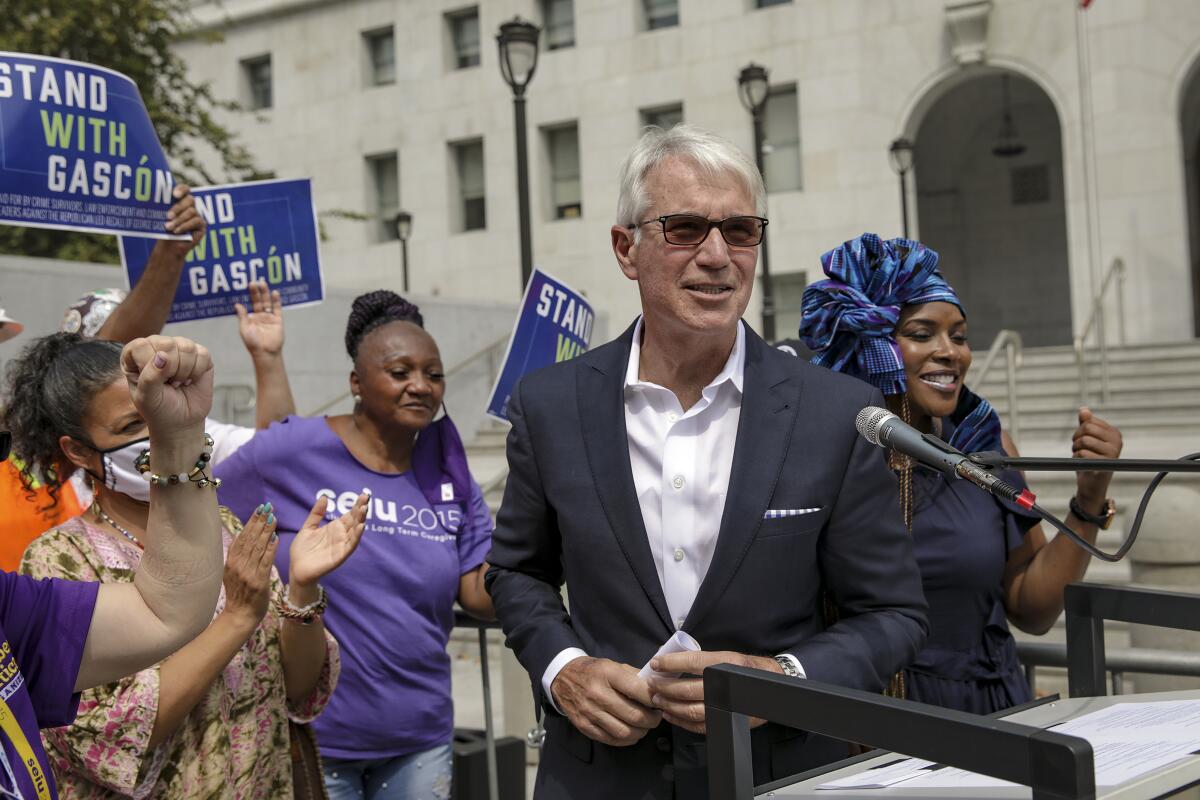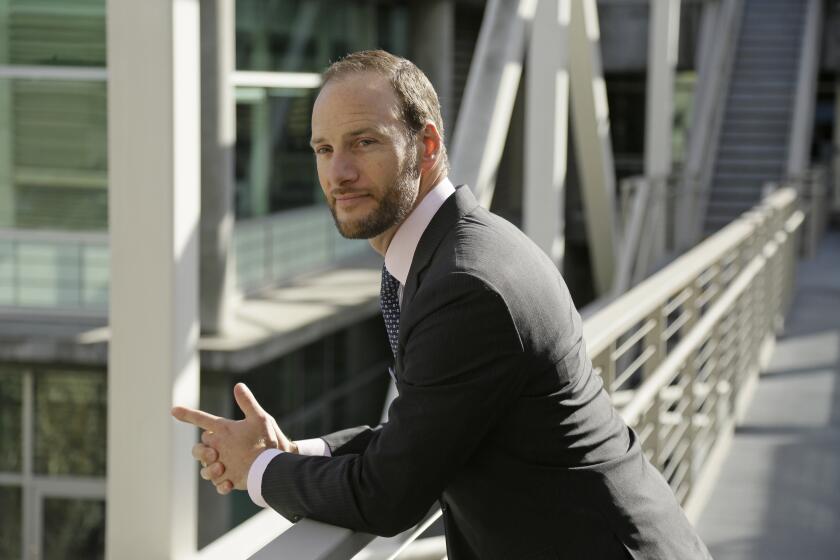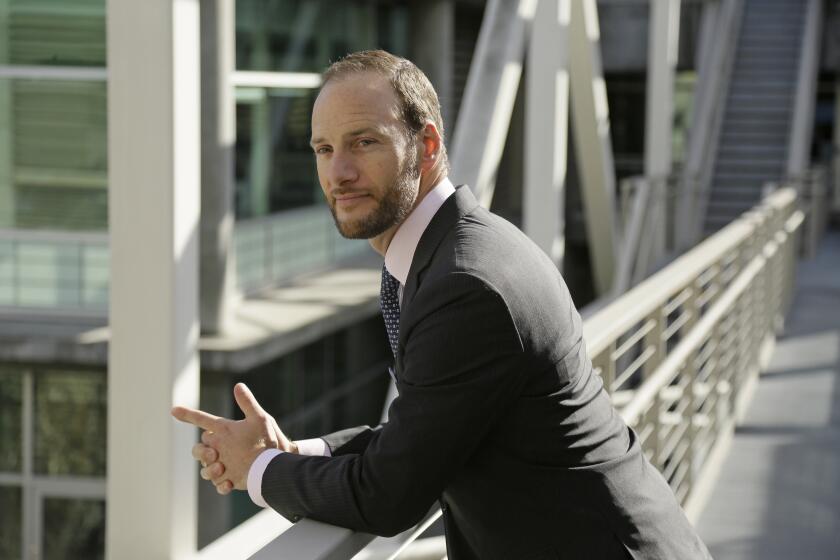San Francisco’s new D.A. says she can ‘restore order’ while pressing reform. Critics aren’t so sure

- Share via
After a tumultuous and expensive recall effort that ousted Chesa Boudin last month, San Francisco has a new district attorney — a prosecutor who quit Boudin’s office to join the campaign against him.
Mayor London Breed named Brooke Jenkins to the interim post Thursday, drawing praise from San Francisco Police Chief Bill Scott and the police union.
Boudin’s supporters, however, have been pushing back, questioning Jenkins’ experience and record on criminal justice reform in a city famous for its historically progressive politics but where public concerns about crime have drawn a more typical law-and-order response from officials.
“Unfortunately, as we all know, we are at a tipping point in San Francisco,” Jenkins said during a news conference Thursday night after Breed’s announcement. “San Franciscans do not feel safe, and concerns surrounding public safety have become their No. 1 concern.”
The recall that ousted Boudin in the middle of his first term became a referendum on some of San Francisco’s most painfully visible social problems, including homelessness, property crime and drug addiction.

The campaign, of which Jenkins was a part, painted Boudin as a soft-on-crime prosecutor. It sought to tie his reform policies to a wave of high-profile crimes, including a fatal hit-and-run involving a man on parole, a series of smash-and-grab robberies from high-end Union Square stores and a wave of attacks against elderly Asian American residents.
Property and violent crimes, in fact, fell by double-digit percentages during Boudin’s first two years in office. But some individual categories of crime surged in the same time: Burglaries rose 47%; motor vehicle theft, 36%. Homicides also increased, though Boudin took office the year after the city saw its lowest number of killings in more than half a century in 2019.
Under her leadership, Jenkins said Thursday, the district attorney’s office “will work diligently every single day to restore order to our city and to bring our city back to being the beautiful city that we know it is.”
She vowed to pursue cases against violent and repeat offenders, those who carry out hate crimes and to crack down on drug use in the streets, though she said she would remain committed to criminal justice reform. Jenkins said she will also make tamping down property crime a priority.
Fears about crime and homelessness have trumped the progressive ideals of San Francisco D.A. Chesa Boudin, who’s locked in a bruising recall election.
But critics said her appointment signaled a backsliding on reform efforts in the district attorney’s office.
John Hamasaki, a San Francisco defense attorney and former police commissioner who frequently spoke out against the Boudin recall, was vocal in his criticism of Jenkins on Twitter, calling her unethical and generally incompetent.
Jenkins has no management experience and has “a pretty good history of what I think is objectively unethical conduct,” Hamasaki told The Times on Friday.
He pointed to Jenkins’ prosecution of Daniel Gudino, who killed his mother during a mental health episode in 2020.
“This was a mentally ill person who killed his mother, and all the doctors except one said he’s out of his mind,” Hamasaki said. “She wanted him in prison for life.”
Gudino was convicted of second-degree murder, but a jury deadlocked on whether he was legally insane, and then-Dist. Atty. Boudin chose to not fight the insanity plea, over Jenkins’ objections, according to SFist. Gudino was committed to a mental hospital, and Jenkins cited the case in an interview with a San Francisco Chronicle columnist about why she left Boudin’s office.
“She quit because she lost and the district attorney wouldn’t let her retry,” Hamasaki said. “There’s enough in her history to show she doesn’t have the experience or judgment to lead the office responsibly.”
The San Francisco Latinx Democratic Club said in a statement Friday that Breed’s appointment of Jenkins signals a return to cash bail, the use of strikes to enhance sentencing penalties, gang enhancements and charging minors as adults — all practices that Boudin had sought to end.
“We unequivocally oppose this dangerous appointment of an individual who is committed to a vision of returning to a world with mass incarceration of our Black and Brown communities; where ‘guilty till proven innocent’ is the motto of the current occupant in the district attorney’s office,” the statement said.
If you can’t make radical change in San Francisco, what future does the progressive prosecutor movement have?
Jenkins pushed back against the allegations.
“There’ve been a lot of misconceived notions about what I stood for,” she said after she was sworn in Friday. “I want to be clear that holding offenders accountable does not mean that we cannot move forward with progressive criminal justice reform.”
Jenkins spoke about her experience as a Black and Latina woman with family members who’ve been charged with crimes.
Reform is necessary, she said, adding that she’s committed to enhancing diversion programs, creating new programs that can serve as alternatives to incarceration and creating an alternative court for women.
“I want to be very clear today that accountability and justice come in many forms,” Jenkins said. “For some, accountability may have to be prison, but for the majority of people it is something else.”
She pledged to ensure that her office uses all resources available to give people accused of crimes a chance to turn their lives around and break the cycle of recidivism.
Jenkins, who spent seven years as an assistant district attorney and worked in the hate crimes, sexual assault and homicide units, will serve until a November special election to decide who will complete Boudin’s term through 2023 — an election in which she is running and could face Boudin.
Like other prosecutors in the nationwide movement to reimagine the criminal justice system, Boudin ran on a platform to reduce mass incarceration and divert low-level offenders into drug and mental health treatment instead of jail cells.
His ouster may have national implications, including for Los Angeles County Dist. Atty. George Gascón, who is facing his second recall attempt in two years.

Jenkins plans to meet with her management team to discuss which of the San Francisco office’s existing policies can be kept and where adjustments need to be made.
“I don’t have any particular positions on what will stay and what will go,” Jenkins said.
Scott, the police chief, said in a tweet that he knew Jenkins to “be a person of principle and integrity,” and that he’s looking forward to working closely with her.
The San Francisco Police Officers Assn. echoed the chief’s comments in a statement.
“We urge Ms. Jenkins to fairly hold criminal offenders accountable, provide compassion for those in the criminal justice system who need and deserve it, and to strongly protect and assist crime victims seeking justice,” union officials said.
For Greg Totten, chief executive of the California District Attorneys Assn., Jenkins’ appointment marks a renewed focus on public safety without sacrificing reform.
“I think it’s a mistake to assume that San Francisco voters don’t still support criminal justice reform,” Totten said. “They don’t want reform that endangers their core safety. They just want the reform to be thoughtful.”
He was critical of top prosecutors such as Boudin and Gascón, who formerly held the post in San Francisco, calling them “rogue D.A.s.”
And Totten, who served as Ventura County district attorney for 18 years until early 2021, said Jenkins’ lack of management experience shouldn’t be an issue.
“Having administrative experience, having experience supervising certainly helps,” he said. “More important is surrounding yourself with people who have experience. The single most important asset is a core understanding of the responsibility of the profession.”
A push to back progressive district attorney candidates across the U.S. is forcing some law-and-order incumbents to embrace criminal justice reform
The executive director of the American Civil Liberties Union of Northern California, Abdi Soltani, said his organization would hold Jenkins accountable and push her to adopt policies in line with the values of civil liberties and civil rights.
“The past two years were difficult, and we acknowledge people are frustrated and angry, but reinstating discriminatory policies that criminalize poverty and addiction won’t make San Francisco any safer,” Soltani said.
Duffie Stone, a past president and current chairman of the board for the National District Attorneys Assn., said prosecutors always seek to improve the criminal justice system but that reforms can’t get in the way of pursuing justice.
“You have to look at the human being and you have to realize that there are some people who will never commit another crime,” said Stone, who serves as the 14th Circuit solicitor in South Carolina. “These are first time, nonviolent offenders, and they need to go to diversion programs.”
Veterans who return from active duty with mental health issues that lead them to commit a crime should go to veterans court so they can be held accountable while also getting treatment, he said, citing an example.
“But then there are also people that embrace antisocial behavior, and you’ve got to recognize that,” Stone said. “The most progressive thing we can do as prosecutors [is] intelligence-led prosecution. It starts in … determining at a very early stage … who is the person you’re dealing with?”
Stone said he sees the criminal justice system moving in a direction where it can identify people who are eligible for diversion programs and other alternatives to incarceration, as well as those who are repeat offenders, and deal with their needs appropriately.
In her news conference Thursday night, Jenkins said San Francisco is “a city of second chances, but the truth is we have to draw a line with people who choose hate, violence and a life of crime.”
More to Read
Sign up for Essential California
The most important California stories and recommendations in your inbox every morning.
You may occasionally receive promotional content from the Los Angeles Times.

















